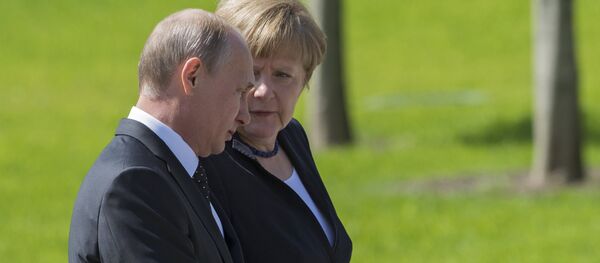United States Commander in Europe Gen. Philip Breedlove claimed on Tuesday that Russia had "weaponized refugees;" this is little more than politically exploitative propaganda, according to French military figures who discussed the matter with the French news web site Atlantico.
On Saturday, "NATO's most senior expert on strategic communications" Janis Sarts reignited anti-Russian rhetoric, telling the Observer that Russia is secretly establishing a network of far-right and far-left political movements to depose German Chancellor Angela Merkel. Telling the Observer that "you can trace Russian funding to the extreme forces in Europe," Sarts failed to name any, despite, according to the Oberver, having "access to intelligence briefings."
"I have to consider this NATO General's words crude propaganda. NATO does not defend Europe, it defends US interests in Europe," retired general and intelligence expert Jean-Bernard Pinatel told Atlantico regarding Breedlove's statement.
The recent rhetoric should be put in the context of the US Senate and the US' desire to strengthen its presence in the region, according to Admiral Alain Coldefy, research director at France's Institute of International Relations and Strategy (IRIS).
"[It] is in the form of a deployment of US forces "rotating" in Poland and in Europe in general added to a substantial increase in budgets. These statements are meant to reassure the Baltic states and Poland and US policy positions on Ukraine, and present Russian actions in a dangerous angle, which is not true," Coldefy told Atlantico.
The US command in Europe uses warlike rhetoric to project the image of a bellicose party, as a result of Russian successes in Syria, according to political scientist at the Institute of Advanced Studies of National Defense, Caroline Galactéros.
"This rising attitude of [NATO], added to its current reactivation of the civil war in Ukraine and posturing and growing military activities on its western flank to prepare to defend its members against purported Russian aggressive tendencies of are quite disturbing," Caroline Galactéros told Atlantico.
"It suggests that we are far from establishing serious Russian-American cooperation to in order finish off Daesh and its cousins of insurgent 'rebellion,'" she added.
Galactéros added that Merkel herself had decided to welcome migrants in act of "bewildering thoughtlessness," and without consulting other EU partners, making it appear as if she alone ran the EU and also sought political "image benefits."



